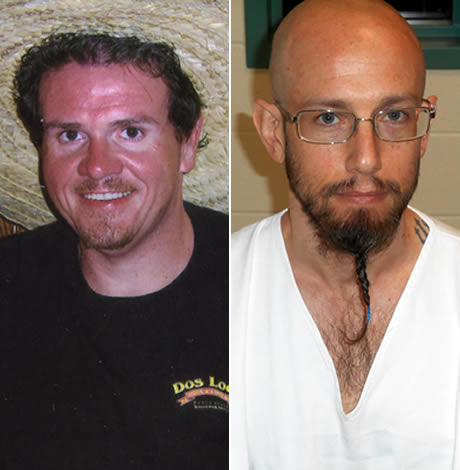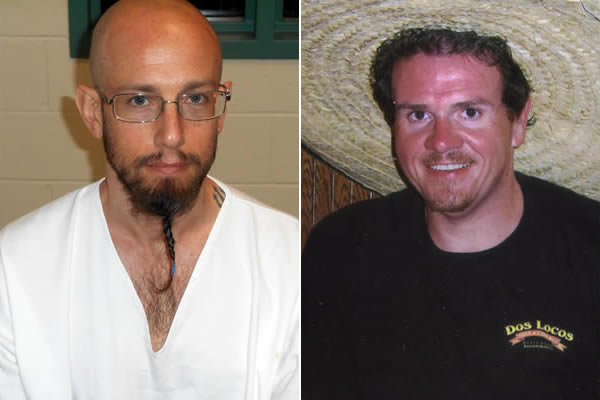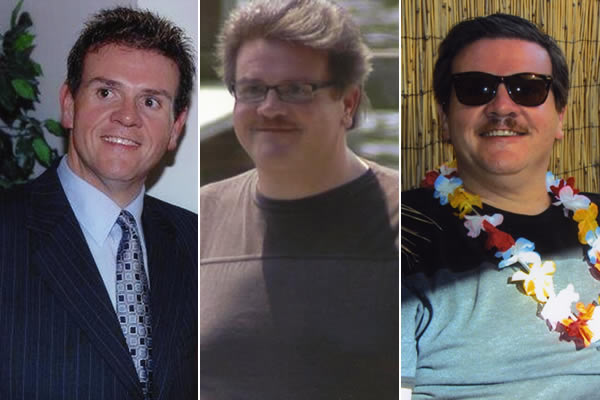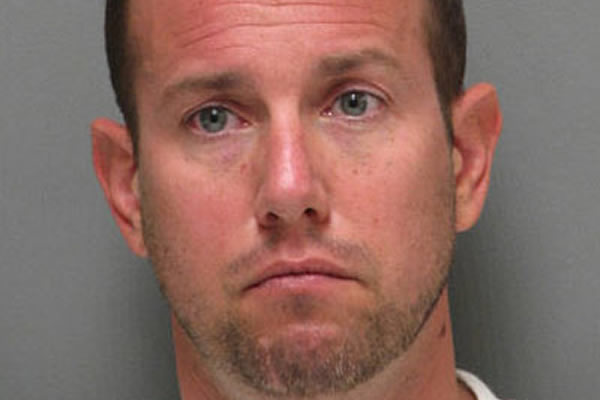homepage news
‘One life ended and one forever changed’
Two years ago, a gay Rehoboth bartender left work drunk, climbed into his Jeep and killed another gay man, shocking a community and highlighting the problem of addiction — and the power of forgiveness


Brian Meegan, shown here at Sussex Correctional Institution where he’s serving at least 8.5 years, struck and killed Russell Henman two years ago. (Washington Blade photo of Meegan by Kevin Naff; photo of Henman courtesy of Barbara Kessler)
REHOBOTH BEACH, Del. — Before Brian Meegan left for work on June 30, 2012, he updated his Facebook status, “Working [a] double today, ready for Super July Fourth Week.”
The double shift bartending at the L Bar was long, extending from afternoon happy hour to past close at 1 a.m. and there was a promotion that day. Representatives from a vodka company were on hand promoting new flavors and cocktails and Meegan joined in, downing shots throughout his shift.
Even though he had two previous arrests for driving under the influence, Meegan left work early in the morning and climbed into his 2003 Jeep Wrangler. He turned left onto Rehoboth Avenue, headed for Route 1 when he hit what he thought was a bicycle from a nearby bike shop. For a moment, he couldn’t see anything through the windshield but kept driving, finally pulling over in a CVS parking lot nearby. He got out and noticed a bike stuck in the wheel well and tried to pull it out when he was spotted by police.
Meegan had struck a fellow gay man and one of the L Bar’s patrons that night, Russell Henman, 44. The impact sent Henman onto the hood and windshield of the car. He was carried 400 feet before the Jeep struck a curb, sending Henman onto the road. He died at the scene.
Meegan’s blood-alcohol level was nearly three times the legal limit; he was charged with first-degree vehicular homicide and driving under the influence, pleaded guilty and sentenced to 15 years with a chance to reduce the sentence to eight-and-a-half years by completing a drug and alcohol rehabilitation program in prison.
Nearly two years after that tragic night, Meegan is serving his time at the Sussex Correctional Institution in Georgetown, Del., and is one of the only openly gay men at the facility. He granted the Washington Blade his first interview to discuss the events of that night and what he hopes to do with his life during and after prison.
There are conflicting versions of exactly what happened at the L Bar that night and lingering concerns about the problem of drunk driving in Rehoboth and the safety of busy Route 1. Some of Henman’s friends remain angry that Meegan was allowed to drink alcohol while working; others are frustrated with Delaware officials for not making safety improvements to Route 1 in the wake of the crash.
Meegan touched on a wide array of topics during about two hours of interviews, conducted in prison with Meegan wearing a white Department of Correction jumpsuit and handcuffed to the cinderblock wall of a private office. He’d had no visitors in prison, until this interview.
“I wouldn’t want to be anyplace else,” Meegan said, “because I killed someone. It was one of the Ten Commandments I thought I could never commit.”
He continued, “This is someone I never knew, someone who had never done anything to me or anyone I know and I never met and I have no animosity for. There’s no way to ever take it back, to make it better; there’s nothing you could ever do. I remember watching TV afterwards and something was funny and I was laughing and I just felt horrible because that’s something he could never do again.”
Asked if he had anything to say to Henman’s family and friends, Meegan replied, “I really hope this article doesn’t hurt them. I don’t want to hurt them more than I already have. There is nothing to say. I hate the fact that it doesn’t change how people drink and drive. It doesn’t stop us. … To his family I should just be dead. I want to hide and for them to never remember who I am. I don’t think anyone wants to hear from me.”
To the gay community in Rehoboth, Meegan offers a piece of advice: “Get a designated driver and stick to it. The first thing to go is your judgment. If my story stops one person from drinking and driving, then it’s worth telling.”
Meegan said he didn’t know Henman and doesn’t remember seeing him in the bar that night. He also said he has no idea how much he drank that day, but that it was a lot.
“It was not unusual for bartenders to drink,” he said.
But John Meng, the L Bar’s co-owner, denied that Meegan was drinking during his shift.
“Brian was not drunk,” Meng told the Blade in an interview last year. “We have video of him at work. I don’t understand what the State Police said. He was not drinking while on his shift.”
Meegan disputes Meng’s assertions and said definitively, “I was drinking.”
Some of Henman’s friends questioned why Meegan was allowed to drink on the job, but there’s nothing in Delaware law that prohibits bartenders from consuming alcohol while working.
“There’s nothing that says they can’t,” said Robert Kracyla, deputy director of Delaware Alcohol & Tobacco Enforcement. He noted that legislation would not be required to make it illegal for bartenders to drink on the job. Such a rule could be enacted by the Alcoholic Beverage Control Commission.
Kracyla said there was no fine or penalty assessed against the L Bar for what happened the night Henman was killed.
“We conducted a full investigation,” Kracyla said. “We were not able to move forward with enough to issue a violation on our end. We did a parallel investigation to the police but there was not enough forensic evidence.”
Delaware is not a dram shop state. Such laws allow for the criminal prosecution of a bar owner or anyone who provides alcohol to someone who causes injury or death as a result. Meegan was not interviewed as part of the investigation as he invoked his Miranda rights against self-incrimination, according to Kracyla.
One issue that remains unclear is whether the company promoting its vodka that night violated a rule about giving away alcohol for free. Meegan said representatives of the company gave him the vodka he consumed. Meegan identified the company as Absolut, but the Blade could not confirm that account.
“According to Alcohol Beverage Control rules you can’t give away alcohol, so if that was going on that would be a violation,” Kracyla said.
The L Bar, which catered to a gay clientele, has since closed and been replaced by a dance club that appeals to a mixed crowd. Meng and his business partner retain ownership of the building, though they are not operating the new club, called Dive.
‘He killed my best friend’

Friends shared their favorite photos of Russell Henman, who was killed two years ago after being hit by a drunk driver in Rehoboth Beach, Del.
“Meegan had a DUI and came back to work unsupervised and was allowed to drink, that’s one thing I’m angry about,” said Barbara Kessler, 56, a close friend of Henman’s. “From a business point of view, the bar should have done something to intervene.”
Kessler and her husband, Steve, 59, live part-time in Rehoboth. They met Henman at a popular area Mexican restaurant, Dos Locos, listening to live music, and quickly became close friends, with Henman regularly staying at their home.
“He was the biggest-hearted guy in the world,” she said. “He loved his family and was utterly devoted to his mother.”
Henman had two brothers who have families of their own and he lived with his mother in Snow Hill, Md. “He used to always say, ‘I’m going to take care of my mom,’” Kessler added. Henman had always dreamed of owning a place in Rehoboth and just eight weeks before he died had purchased a trailer there, she said.
“He was loving life, this was going to be his summer, he had his own place to call home,” Kessler said. “It was so unfair it was snatched from him.”
Asked about Meegan’s sentence, Kessler said, “I feel bad for his situation but he killed my best friend. I don’t know what to think of that. I miss Russ every day. I feel for Brian’s family having a son who went to the dark side. I’ve forgiven him, it doesn’t bring Russ back to hate him.”
Her husband Steve echoed other friends who said they hope Meegan will find help while in prison.
“It’s a confounding thing that people can have so many DUIs and remain on the road,” he said. “To drag him and then drive away, we were distraught over that. I don’t know what’s fair but nothing brings Russ back. I hope he uses prison to turn his life around.”
Barbara Kessler said Henman’s mother has decided against pursuing a civil lawsuit against the L Bar. “She said ‘we’re not the type of people that sue, nothing can be gained from it,’” Kessler recalled.
Two previous arrests
Meegan moved to Rehoboth in May 2012 from Fort Lauderdale. He had never been to Rehoboth before but said he met some people from the area in Florida who encouraged him to visit. He was arrested six weeks before Henman was killed on a DUI charge in Rehoboth after he said he backed into another car in the L Bar parking lot.
“The other guy wanted a police report,” Meegan said. “He called the cops and they did sobriety tests and I got arrested for a DUI.”
In 2005, Meegan was arrested in New York on a DUI charge. He said he drove 20-30 miles out of his way on the Southern State Parkway in Long Island, headed in the opposite direction of his intended destination.
“That’s one of those moments when, as a drinker, you delude yourself,” he said. “You should say, ‘I’m an alcoholic’ and instead you say ‘Wow, I‘m a really great driver.’ It scared me then, but it didn’t last.”
He was sentenced to attend driving classes but received no jail time.
From privilege to addiction

Brian Meegan (Photo courtesy of the Delaware State Police)
Meegan, 39, grew up in Garden City, N.Y., a small town of 22,000 mostly white residents about 20 miles from Manhattan. A 2007 estimate put the median income for a family there at more than $160,000. It’s a wealthy enclave and a privileged place to grow up.
“One thing about rich white suburban kids is that we drink,” Meegan said. “Drinking was fun especially if you feel awkward.”
After high school, Meegan pursued a degree in marine sciences at the University of Miami but dropped out in 1994 after just one year. He said he wanted to come out to his father but feared being cut off financially as a result. His mother discovered he’s gay in high school, but Meegan said they kept it from his father. He dropped out and became independent so his father wouldn’t have financial control over his life.
“My Dad didn’t want me to go through the struggles associated with being gay,” Meegan said. “He was afraid of me getting HIV and he still doesn’t know I’m positive.”
The pressure of fitting in and feeling “awkward” is something Meegan said he experienced again later in life when he came out as gay.
“Going into the gay community is like going through adolescence again,” he said. “So you feel like a 13-year-old awkward kid again and now you’re legally able to drink and it helps.”
Looking back, Meegan now says that dropping out of school was one of the biggest mistakes he made. After leaving school and coming out to his father he spent some time in Miami working as a bartender, then moved to New York City. That period began a spiral of destructive behavior, including drug abuse, prostitution and stripping that spun out of control. There were years spent following the gay party scene — Miami, Fort Lauderdale and Aspen in the winters and Fire Island and Provincetown in the summers.
He also found work as a model, which ironically led to more problems with his self-esteem.
“I was not a cool kid,” he said. “Suddenly to be a bartender and model and to be sought after by people was hard for me. I’m a geek who’s fat with braces and bifocals and now people want to pay me $7,000 to stand in front of a camera.”
He turned to alcohol and drugs to cope, a strategy familiar to many in the LGBT community, which suffers disproportionately high rates of alcoholism and drug addiction, according to the Centers for Disease Control and Prevention.
“When you start doing the bartending and acting and modeling, they are scenes that are very big on drinking and drugs so it just becomes part of a normal life, you don’t think of it as this seedy lifestyle,” Meegan said. “You’re not going to the back alley to get these things.”
In 2001, just after the terrorist attacks of Sept. 11, Meegan returned to the city from Fire Island to check on an ex-boyfriend who lived near the towers. His friend was OK but on that same day, Meegan said he received an email from a former client of his prostitution services informing him that he was HIV positive and urging Meegan to get tested. A few weeks later he did and learned he, too, was positive.
“At the time, HIV was more of a death sentence,” he recalled. “I obliterated my feelings [with alcohol] so I don’t remember that time very well.”
Crystal meth soon became his drug of choice.
“I drank for confidence and comfort, then I met meth,” he said. “I was thin, felt sexy, had energy to do everything I wanted. I could clean, cook, do laundry, have sex, spend time at the beach and work because I barely slept.”
In 2007, he said he started to gain weight and to sleep on meth and that’s when he knew he was doing too much and quit on Aug. 4, 2007, cold turkey. His weight ballooned to 250 pounds and he continued to drink.
“My ex dumped me for weighing 250 pounds but he was supportive of me quitting drugs,” he said.
Meegan’s peripatetic existence eventually led him to Rehoboth, another gay-popular resort town.
Rehoboth dream realized
Henman loved Rehoboth, according to friends, and he saved money for five years to purchase his first place in 2012.
“As Rusty got more enamored with Rehoboth he wanted to see if he could swing a place on his own,” said Brian Gray, 46, a close friend and part-time Rehoboth resident. “He bought a camper and was renting space and was talking about buying a permanent mobile home.”
Friends describe him as fun loving, someone who appreciated an over-the-top gesture and who enjoyed entertaining, spending weekends with friends and especially karaoke.
“He lived a simple life but would give you the shirt off his back,” Gray said. “He loved Rehoboth, karaoke, Rigby’s, he loved Purple Parrot, anywhere with karaoke. He loved music and he liked to sing.”
Henman worked for about 25 years as a loan officer at PNC Bank and was single when he died. He adored his dog Maddy.
“He always did things by the book,” said Bryan Hecksher, another close friend. “His heart was as big as he was. He loved to cook and to do crafts. I used to joke with him that ‘I’m not that gay,’” he said laughing. “I really miss his Facebook posts on what he made for dinner. I used to look forward to those every night and would comment on them.”
A fateful night

Critics say these green plastic lane dividers separating busy Route 1 from a service road are insufficient and dangerous. Russell Henman was killed on the service road after being hit by a drunk driver. (Washington Blade photos by Michael Key)
In a small town like Rehoboth, everyone crosses paths with everyone else eventually. Hecksher knew Meegan from the L Bar and even picked him up from the police station after his first Rehoboth DUI arrest in May 2012.
“I made him promise not to do it again,” Hecksher said. “People cared for Brian too. I don’t hate Brian Meegan but I don’t understand his actions. You can call a cab or call a friend — he could have called me. He had plenty of choices.”
Gray, meanwhile, was with Henman on the night he died and even offered him a ride home just minutes before he was killed. Earlier in the evening, he was at Henman’s home for a cookout and the two decided to go to the L Bar. When the bar closed at 1 a.m., they walked to 7-Eleven, ordered a pizza and sat in a nearby park talking and eating. Gray recalled that Henman talked about his family and his young niece in particular. After about an hour in the park, Gray said they walked back to the L Bar, where Henman had left his bike. Gray said Henman turned on his bike’s safety blinkers and invited him to breakfast in the morning.
“I offered to drive him and put his bike in my car and he said no,” Gray said. “He rode into town most evenings and felt safe doing that. He avoided Route 1.”
Gray insists neither he nor Henman was intoxicated. Other friends said Henman wasn’t a big drinker. Meegan, on the other hand, appeared drunk, Gray said. He said he and Henman observed other customers in the L Bar buying shots for Meegan.
“His eyes were bloodshot,” Gray said. “He seemed under the influence of something. You never see that happen at the Blue Moon — you don’t see bartenders drinking. All of the bartenders were doing shots that night.”
Gray said he followed Henman for a short distance, then drove home. It was only minutes later that Meegan pulled out of the parking lot.
“I texted him the next morning about breakfast and there was no response,” Gray said.
Meegan said he remembers very little about what happened.
“I thought I hit the curb, I couldn’t see out the windshield,” he said. “The police were adamant that I must have known but I didn’t. I remember the police being very upset that I wasn’t more upset. I had one cop tell me, ‘I’ve had people arrested for shoplifting and they’re crying,’ but I was in shock.”
Despite his lengthy sentence, Meegan said he doesn’t regret pleading guilty. The prosecutor sought six years in prison, but in February 2013, Judge Richard Stokes sentenced him to 15 years, reduced to 8.5 years upon completion of the “Key” program, a drug and alcohol treatment program. “The judge decided to make an example of me,” Meegan said.
Bias behind bars
Today, Meegan’s days are spent reading, writing and serving food in the prison cafeteria. Early on, he described fits of crying at night. Now he survives by isolating himself from other inmates and writing. As an openly gay man, he knows there are constant risks to his personal safety. He said he endures frequent anti-gay slurs from inmates. “Sometimes the corrections officers chime in, too.”
“I’m upfront about being gay,” he said. “When someone new starts talking to me, I tell them right away because just for talking to me, people are going to hate you.”
Even the lone minister at Sussex Correctional preaches against homosexuality, he said. “The only minister who comes in every Sunday is against it and I have people saying things like ‘God bless you, fucking faggot,’” he said. Meegan has stopped attending services but has maintained contact with his former Episcopalian minister from New York, who did not respond to a Blade inquiry.
Despite the abuse, Meegan seems to have found a purpose in coming out behind prison walls — a purpose inspired by Rusty Henman. Meegan said Henman’s mother talked at the trial about her son’s advocacy work for LGBT and other charitable causes.
“I think my sentence here is to make it easier for the next generation,” he said. “I know some people in here who are in their 20s and have long sentences and are gay and they hide it. They won’t talk to me because it would implicate them. They’re worse to me than other inmates. If I can make people understand that being gay isn’t this horrible thing … maybe that could help.”
He added that he prays for Henman’s mother every night and has even talked to Rusty in prison.
Although he’s out as gay, Meegan said the inmates do not know he’s HIV positive. He lies to them about the daily medication he takes when they ask, “What’s the Skittles you’re getting?” He’s been positive for 13 years and his health is good, he said. He attends weekly Alcoholics Anonymous meetings.
Henman’s friends seem satisfied with the sentence and hopeful that Meegan will turn his life around after prison.
“I hope he uses this time to change his core behavior,” said Hecksher. “I think the sentence was fair and will give him time to reflect.”
Gray echoed that sentiment.
“People make mistakes in life,” Gray said. “Hopefully he’ll have an opportunity to take care of the alcohol problem he has. He’s being punished and hopefully when he gets out he’ll be a changed person.”
Barbara Kessler urged forgiveness. “I think he’s hurting also,” she said. “You have to find forgiveness in your heart, otherwise it’ll eat you up.”
Another thing they agree on: Sussex County needs to improve pedestrian safety on Route 1, especially the spot where the highway intersects with the main road leading into downtown Rehoboth and the service road where Henman died.
“What’s tragic is that two years later, we’re still working on ideas for improving safety on Route 1,” Hecksher said. “Something should be done.”
Gray said there are plenty of ideas for improving safety, including construction of a jersey wall at the accident site to better insulate the service road from Route 1. In addition, he noted the lack of crosswalks in the area and said a seasonal shuttle should be expanded to year-round service.
“Absolutely nothing has been done to improve safety on Route 1,” he said. “How many people have to die for Sussex County to wake up and do something?”
The other fear they share is of drunk drivers, especially in summer, which arrives unofficially this week with Memorial Day celebrations.
“In Rehoboth, I worry all the time about drinking and driving,” Hecksher said.
In prison, Meegan has settled into a new routine and he worries that as life goes on, he will forget the details of what he did that put him there.
“We have a very easy time of disassociating,” Meegan said. “Something I thought I would never stop thinking about every single day, in here, there are days when you forget completely now, which feels horrible the next day when I remember it. How could I do that and now it’s becoming a distant memory, which feels horrible.”
The memory remains fresh for the friends and loved ones left behind.
“One life ended and one is forever changed,” said Hecksher. “One careless move left a huge void in the whole community.”
homepage news
Honoring the legacy of New Orleans’ 1973 UpStairs Lounge fire
Why the arson attack that killed 32 gay men still resonates 50 years later

On June 23 of last year, I held the microphone as a gay man in the New Orleans City Council Chamber and related a lost piece of queer history to the seven council members. I told this story to disabuse all New Orleanians of the notion that silence and accommodation, in the face of institutional and official failures, are a path to healing.
The story I related to them began on a typical Sunday night at a second-story bar on the fringe of New Orleans’ French Quarter in 1973, where working-class men would gather around a white baby grand piano and belt out the lyrics to a song that was the anthem of their hidden community, “United We Stand” by the Brotherhood of Man.
“United we stand,” the men would sing together, “divided we fall” — the words epitomizing the ethos of their beloved UpStairs Lounge bar, an egalitarian free space that served as a forerunner to today’s queer safe havens.
Around that piano in the 1970s Deep South, gays and lesbians, white and Black queens, Christians and non-Christians, and even early gender minorities could cast aside the racism, sexism, and homophobia of the times to find acceptance and companionship for a moment.
For regulars, the UpStairs Lounge was a miracle, a small pocket of acceptance in a broader world where their very identities were illegal.
On the Sunday night of June 24, 1973, their voices were silenced in a murderous act of arson that claimed 32 lives and still stands as the deadliest fire in New Orleans history — and the worst mass killing of gays in 20th century America.
As 13 fire companies struggled to douse the inferno, police refused to question the chief suspect, even though gay witnesses identified and brought the soot-covered man to officers idly standing by. This suspect, an internally conflicted gay-for-pay sex worker named Rodger Dale Nunez, had been ejected from the UpStairs Lounge screaming the word “burn” minutes before, but New Orleans police rebuffed the testimony of fire survivors on the street and allowed Nunez to disappear.
As the fire raged, police denigrated the deceased to reporters on the street: “Some thieves hung out there, and you know this was a queer bar.”
For days afterward, the carnage met with official silence. With no local gay political leaders willing to step forward, national Gay Liberation-era figures like Rev. Troy Perry of the Metropolitan Community Church flew in to “help our bereaved brothers and sisters” — and shatter officialdom’s code of silence.
Perry broke local taboos by holding a press conference as an openly gay man. “It’s high time that you people, in New Orleans, Louisiana, got the message and joined the rest of the Union,” Perry said.
Two days later, on June 26, 1973, as families hesitated to step forward to identify their kin in the morgue, UpStairs Lounge owner Phil Esteve stood in his badly charred bar, the air still foul with death. He rebuffed attempts by Perry to turn the fire into a call for visibility and progress for homosexuals.
“This fire had very little to do with the gay movement or with anything gay,” Esteve told a reporter from The Philadelphia Inquirer. “I do not want my bar or this tragedy to be used to further any of their causes.”
Conspicuously, no photos of Esteve appeared in coverage of the UpStairs Lounge fire or its aftermath — and the bar owner also remained silent as he witnessed police looting the ashes of his business.
“Phil said the cash register, juke box, cigarette machine and some wallets had money removed,” recounted Esteve’s friend Bob McAnear, a former U.S. Customs officer. “Phil wouldn’t report it because, if he did, police would never allow him to operate a bar in New Orleans again.”
The next day, gay bar owners, incensed at declining gay bar traffic amid an atmosphere of anxiety, confronted Perry at a clandestine meeting. “How dare you hold your damn news conferences!” one business owner shouted.
Ignoring calls for gay self-censorship, Perry held a 250-person memorial for the fire victims the following Sunday, July 1, culminating in mourners defiantly marching out the front door of a French Quarter church into waiting news cameras. “Reverend Troy Perry awoke several sleeping giants, me being one of them,” recalled Charlene Schneider, a lesbian activist who walked out of that front door with Perry.

Esteve doubted the UpStairs Lounge story’s capacity to rouse gay political fervor. As the coroner buried four of his former patrons anonymously on the edge of town, Esteve quietly collected at least $25,000 in fire insurance proceeds. Less than a year later, he used the money to open another gay bar called the Post Office, where patrons of the UpStairs Lounge — some with visible burn scars — gathered but were discouraged from singing “United We Stand.”
New Orleans cops neglected to question the chief arson suspect and closed the investigation without answers in late August 1973. Gay elites in the city’s power structure began gaslighting the mourners who marched with Perry into the news cameras, casting suspicion on their memories and re-characterizing their moment of liberation as a stunt.
When a local gay journalist asked in April 1977, “Where are the gay activists in New Orleans?,” Esteve responded that there were none, because none were needed. “We don’t feel we’re discriminated against,” Esteve said. “New Orleans gays are different from gays anywhere else… Perhaps there is some correlation between the amount of gay activism in other cities and the degree of police harassment.”

An attitude of nihilism and disavowal descended upon the memory of the UpStairs Lounge victims, goaded by Esteve and fellow gay entrepreneurs who earned their keep via gay patrons drowning their sorrows each night instead of protesting the injustices that kept them drinking.
Into the 1980s, the story of the UpStairs Lounge all but vanished from conversation — with the exception of a few sanctuaries for gay political debate such as the local lesbian bar Charlene’s, run by the activist Charlene Schneider.
By 1988, the 15th anniversary of the fire, the UpStairs Lounge narrative comprised little more than a call for better fire codes and indoor sprinklers. UpStairs Lounge survivor Stewart Butler summed it up: “A tragedy that, as far as I know, no good came of.”
Finally, in 1991, at Stewart Butler and Charlene Schneider’s nudging, the UpStairs Lounge story became aligned with the crusade of liberated gays and lesbians seeking equal rights in Louisiana. The halls of power responded with intermittent progress. The New Orleans City Council, horrified by the story but not yet ready to take its look in the mirror, enacted an anti-discrimination ordinance protecting gays and lesbians in housing, employment, and public accommodations that Dec. 12 — more than 18 years after the fire.
“I believe the fire was the catalyst for the anger to bring us all to the table,” Schneider told The Times-Picayune, a tacit rebuke to Esteve’s strategy of silent accommodation. Even Esteve seemed to change his stance with time, granting a full interview with the first UpStairs Lounge scholar Johnny Townsend sometime around 1989.
Most of the figures in this historic tale are now deceased. What’s left is an enduring story that refused to go gently. The story now echoes around the world — a musical about the UpStairs Lounge fire recently played in Tokyo, translating the gay underworld of the 1973 French Quarter for Japanese audiences.
When I finished my presentation to the City Council last June, I looked up to see the seven council members in tears. Unanimously, they approved a resolution acknowledging the historic failures of city leaders in the wake of the UpStairs Lounge fire.
Council members personally apologized to UpStairs Lounge families and survivors seated in the chamber in a symbolic act that, though it could not bring back those who died, still mattered greatly to those whose pain had been denied, leaving them to grieve alone. At long last, official silence and indifference gave way to heartfelt words of healing.
The way Americans remember the past is an active, ongoing process. Our collective memory is malleable, but it matters because it speaks volumes about our maturity as a people, how we acknowledge the past’s influence in our lives, and how it shapes the examples we set for our youth. Do we grapple with difficult truths, or do we duck accountability by defaulting to nostalgia and bluster? Or worse, do we simply ignore the past until it fades into a black hole of ignorance and indifference?
I believe that a factual retelling of the UpStairs Lounge tragedy — and how, 50 years onward, it became known internationally — resonates beyond our current divides. It reminds queer and non-queer Americans that ignoring the past holds back the present, and that silence is no cure for what ails a participatory nation.
Silence isolates. Silence gaslights and shrouds. It preserves the power structures that scapegoat the disempowered.
Solidarity, on the other hand, unites. Solidarity illuminates a path forward together. Above all, solidarity transforms the downtrodden into a resounding chorus of citizens — in the spirit of voices who once gathered ‘round a white baby grand piano and sang, joyfully and loudly, “United We Stand.”

Robert W. Fieseler is a New Orleans-based journalist and the author of “Tinderbox: the Untold Story of the Up Stairs Lounge Fire and the Rise of Gay Liberation.”
homepage news
New Supreme Court term includes critical LGBTQ case with ‘terrifying’ consequences
Business owner seeks to decline services for same-sex weddings

The U.S. Supreme Court, after a decision overturning Roe v. Wade that still leaves many reeling, is starting a new term with justices slated to revisit the issue of LGBTQ rights.
In 303 Creative v. Elenis, the court will return to the issue of whether or not providers of custom-made goods can refuse service to LGBTQ customers on First Amendment grounds. In this case, the business owner is Lorie Smith, a website designer in Colorado who wants to opt out of providing her graphic design services for same-sex weddings despite the civil rights law in her state.
Jennifer Pizer, acting chief legal officer of Lambda Legal, said in an interview with the Blade, “it’s not too much to say an immeasurably huge amount is at stake” for LGBTQ people depending on the outcome of the case.
“This contrived idea that making custom goods, or offering a custom service, somehow tacitly conveys an endorsement of the person — if that were to be accepted, that would be a profound change in the law,” Pizer said. “And the stakes are very high because there are no practical, obvious, principled ways to limit that kind of an exception, and if the law isn’t clear in this regard, then the people who are at risk of experiencing discrimination have no security, no effective protection by having a non-discrimination laws, because at any moment, as one makes their way through the commercial marketplace, you don’t know whether a particular business person is going to refuse to serve you.”
The upcoming arguments and decision in the 303 Creative case mark a return to LGBTQ rights for the Supreme Court, which had no lawsuit to directly address the issue in its previous term, although many argued the Dobbs decision put LGBTQ rights in peril and threatened access to abortion for LGBTQ people.
And yet, the 303 Creative case is similar to other cases the Supreme Court has previously heard on the providers of services seeking the right to deny services based on First Amendment grounds, such as Masterpiece Cakeshop and Fulton v. City of Philadelphia. In both of those cases, however, the court issued narrow rulings on the facts of litigation, declining to issue sweeping rulings either upholding non-discrimination principles or First Amendment exemptions.
Pizer, who signed one of the friend-of-the-court briefs in opposition to 303 Creative, said the case is “similar in the goals” of the Masterpiece Cakeshop litigation on the basis they both seek exemptions to the same non-discrimination law that governs their business, the Colorado Anti-Discrimination Act, or CADA, and seek “to further the social and political argument that they should be free to refuse same-sex couples or LGBTQ people in particular.”
“So there’s the legal goal, and it connects to the social and political goals and in that sense, it’s the same as Masterpiece,” Pizer said. “And so there are multiple problems with it again, as a legal matter, but also as a social matter, because as with the religion argument, it flows from the idea that having something to do with us is endorsing us.”
One difference: the Masterpiece Cakeshop litigation stemmed from an act of refusal of service after owner, Jack Phillips, declined to make a custom-made wedding cake for a same-sex couple for their upcoming wedding. No act of discrimination in the past, however, is present in the 303 Creative case. The owner seeks to put on her website a disclaimer she won’t provide services for same-sex weddings, signaling an intent to discriminate against same-sex couples rather than having done so.
As such, expect issues of standing — whether or not either party is personally aggrieved and able bring to a lawsuit — to be hashed out in arguments as well as whether the litigation is ripe for review as justices consider the case. It’s not hard to see U.S. Chief Justice John Roberts, who has sought to lead the court to reach less sweeping decisions (sometimes successfully, and sometimes in the Dobbs case not successfully) to push for a decision along these lines.
Another key difference: The 303 Creative case hinges on the argument of freedom of speech as opposed to the two-fold argument of freedom of speech and freedom of religious exercise in the Masterpiece Cakeshop litigation. Although 303 Creative requested in its petition to the Supreme Court review of both issues of speech and religion, justices elected only to take up the issue of free speech in granting a writ of certiorari (or agreement to take up a case). Justices also declined to accept another question in the petition request of review of the 1990 precedent in Smith v. Employment Division, which concluded states can enforce neutral generally applicable laws on citizens with religious objections without violating the First Amendment.
Representing 303 Creative in the lawsuit is Alliance Defending Freedom, a law firm that has sought to undermine civil rights laws for LGBTQ people with litigation seeking exemptions based on the First Amendment, such as the Masterpiece Cakeshop case.
Kristen Waggoner, president of Alliance Defending Freedom, wrote in a Sept. 12 legal brief signed by her and other attorneys that a decision in favor of 303 Creative boils down to a clear-cut violation of the First Amendment.
“Colorado and the United States still contend that CADA only regulates sales transactions,” the brief says. “But their cases do not apply because they involve non-expressive activities: selling BBQ, firing employees, restricting school attendance, limiting club memberships, and providing room access. Colorado’s own cases agree that the government may not use public-accommodation laws to affect a commercial actor’s speech.”
Pizer, however, pushed back strongly on the idea a decision in favor of 303 Creative would be as focused as Alliance Defending Freedom purports it would be, arguing it could open the door to widespread discrimination against LGBTQ people.
“One way to put it is art tends to be in the eye of the beholder,” Pizer said. “Is something of a craft, or is it art? I feel like I’m channeling Lily Tomlin. Remember ‘soup and art’? We have had an understanding that whether something is beautiful or not is not the determining factor about whether something is protected as artistic expression. There’s a legal test that recognizes if this is speech, whose speech is it, whose message is it? Would anyone who was hearing the speech or seeing the message understand it to be the message of the customer or of the merchants or craftsmen or business person?”
Despite the implications in the case for LGBTQ rights, 303 Creative may have supporters among LGBTQ people who consider themselves proponents of free speech.
One joint friend-of-the-court brief before the Supreme Court, written by Dale Carpenter, a law professor at Southern Methodist University who’s written in favor of LGBTQ rights, and Eugene Volokh, a First Amendment legal scholar at the University of California, Los Angeles, argues the case is an opportunity to affirm the First Amendment applies to goods and services that are uniquely expressive.
“Distinguishing expressive from non-expressive products in some contexts might be hard, but the Tenth Circuit agreed that Smith’s product does not present a hard case,” the brief says. “Yet that court (and Colorado) declined to recognize any exemption for products constituting speech. The Tenth Circuit has effectively recognized a state interest in subjecting the creation of speech itself to antidiscrimination laws.”
Oral arguments in the case aren’t yet set, but may be announced soon. Set to defend the state of Colorado and enforcement of its non-discrimination law in the case is Colorado Solicitor General Eric Reuel Olson. Just this week, the U.S. Supreme Court announced it would grant the request to the U.S. solicitor general to present arguments before the justices on behalf of the Biden administration.
With a 6-3 conservative majority on the court that has recently scrapped the super-precedent guaranteeing the right to abortion, supporters of LGBTQ rights may think the outcome of the case is all but lost, especially amid widespread fears same-sex marriage would be next on the chopping block. After the U.S. Tenth Circuit Court of Appeals ruled against 303 Creative in the lawsuit, the simple action by the Supreme Court to grant review in the lawsuit suggests they are primed to issue a reversal and rule in favor of the company.
Pizer, acknowledging the call to action issued by LGBTQ groups in the aftermath of the Dobbs decision, conceded the current Supreme Court issuing the ruling in this case is “a terrifying prospect,” but cautioned the issue isn’t so much the makeup of the court but whether or not justices will continue down the path of abolishing case law.
“I think the question that we’re facing with respect to all of the cases or at least many of the cases that are in front of the court right now, is whether this court is going to continue on this radical sort of wrecking ball to the edifice of settled law and seemingly a goal of setting up whole new structures of what our basic legal principles are going to be. Are we going to have another term of that?” Pizer said. “And if so, that’s terrifying.”
homepage news
Kelley Robinson, a Black, queer woman, named president of Human Rights Campaign
Progressive activist a veteran of Planned Parenthood Action Fund

Kelley Robinson, a Black, queer woman and veteran of Planned Parenthood Action Fund, is to become the next president of the Human Rights Campaign, the nation’s leading LGBTQ group announced on Tuesday.
Robinson is set to become the ninth president of the Human Rights Campaign after having served as executive director of Planned Parenthood Action Fund and more than 12 years of experience as a leader in the progressive movement. She’ll be the first Black, queer woman to serve in that role.
“I’m honored and ready to lead HRC — and our more than three million member-advocates — as we continue working to achieve equality and liberation for all Lesbian, Gay, Bisexual, Transgender, and Queer people,” Robinson said. “This is a pivotal moment in our movement for equality for LGBTQ+ people. We, particularly our trans and BIPOC communities, are quite literally in the fight for our lives and facing unprecedented threats that seek to destroy us.”
The next Human Rights Campaign president is named as Democrats are performing well in polls in the mid-term elections after the U.S. Supreme Court overturned Roe v. Wade, leaving an opening for the LGBTQ group to play a key role amid fears LGBTQ rights are next on the chopping block.
“The overturning of Roe v. Wade reminds us we are just one Supreme Court decision away from losing fundamental freedoms including the freedom to marry, voting rights, and privacy,” Robinson said. “We are facing a generational opportunity to rise to these challenges and create real, sustainable change. I believe that working together this change is possible right now. This next chapter of the Human Rights Campaign is about getting to freedom and liberation without any exceptions — and today I am making a promise and commitment to carry this work forward.”
The Human Rights Campaign announces its next president after a nearly year-long search process after the board of directors terminated its former president Alphonso David when he was ensnared in the sexual misconduct scandal that led former New York Gov. Andrew Cuomo to resign. David has denied wrongdoing and filed a lawsuit against the LGBTQ group alleging racial discrimination.

-

 State Department2 days ago
State Department2 days agoState Department releases annual human rights report
-

 Maryland4 days ago
Maryland4 days agoJoe Vogel campaign holds ‘Big Gay Canvass Kickoff’
-

 Politics3 days ago
Politics3 days agoSmithsonian staff concerned about future of LGBTQ programming amid GOP scrutiny
-

 The White House1 day ago
The White House1 day agoWhite House debuts action plan targeting pollutants in drinking water












